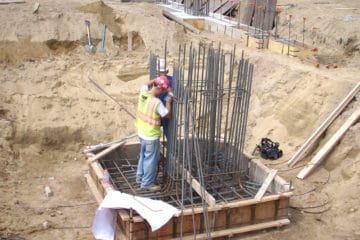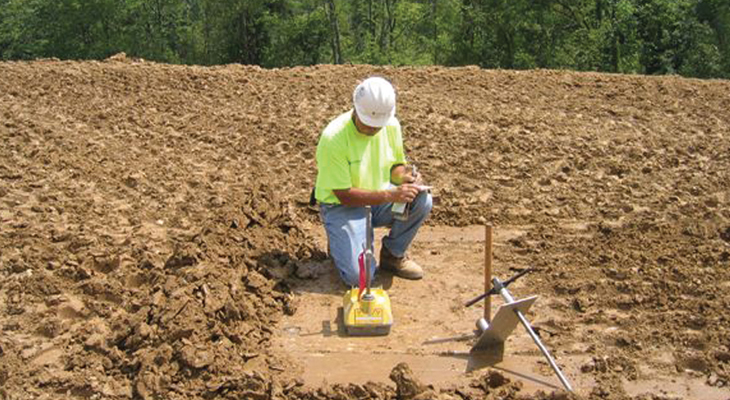Tailings Engineer: Crucial Proficiency for Lasting Waste Monitoring in Mining
Tailings Engineer: Crucial Proficiency for Lasting Waste Monitoring in Mining
Blog Article
Understanding the Crucial Function of the Geotechnical Industry in Modern Building And Construction Projects and Facilities Development
The geotechnical sector is a foundation of modern-day building and framework advancement, giving essential understandings into soil behavior that straight affect task results. With advanced soil assessments and innovative engineering services, geotechnical specialists not just ensure structural honesty but also address sustainability concerns in the middle of evolving environmental standards.
Value of Soil Analysis
Dirt assessment plays an essential role in the geotechnical sector, offering as the structure for notified decision-making in building tasks. Precise dirt evaluation is crucial for determining the suitability of a website for different sorts of structures, including household homes, commercial buildings, and bridges. By examining soil make-up, dampness, stamina, and thickness web content, designers can prepare for possible obstacles and mitigate risks related to ground instability, disintegration, and negotiation.
The analysis process normally entails a series of examinations and monitorings that supply essential info about the subsurface problems. This data notifies the layout and building and construction processes, guaranteeing that frameworks are built on solid ground with ample support. Recognizing the dirt account makes it possible for designers to select appropriate building and construction approaches and materials, enhancing source application and decreasing expenses.
In addition to ensuring structural honesty, soil evaluation adds to environmental sustainability. By recognizing possible contamination or negative effects on surrounding environments, engineers can implement strategies to secure these natural deposits. Overall, thorough soil analysis is important in the geotechnical area, underpinning the security, effectiveness, and ecological obligation of construction tasks.
Key Geotechnical Techniques
A range of crucial geotechnical strategies are employed to analyze and improve the security and performance of construction sites. One foundational approach is dirt tasting and testing, which enables engineers to determine the physical and chemical buildings of the ground. This info is crucial for making educated decisions pertaining to foundation design and building and construction approaches.
One more crucial strategy is site characterization, which includes the comprehensive evaluation of soil and rock problems through methods such as borehole drilling and in-situ screening. Methods like Standard Penetration Examinations (SPT) and Cone Infiltration Tests (CPT) offer useful information on soil toughness and stratigraphy.
Ground improvement methods, such as soil stabilization and grouting, are also vital in enhancing the load-bearing ability of weak dirts. These approaches can minimize settlement and improve overall website conditions.
Furthermore, incline security evaluation is important for recognizing potential landslide risks and guaranteeing the security of excavations. This evaluation commonly employs mathematical modeling and limit stability techniques to anticipate soil actions under numerous problems.
Integrating these geotechnical methods into building and construction planning not just optimizes task results but likewise makes sure the long-term sustainability of infrastructure advancement.
Influence On Building Security

Furthermore, effective geotechnical design entails applying mitigation approaches for recognized dangers. This may include soil stabilization pop over to this site strategies, retaining frameworks, or drainage systems to alleviate hydrostatic pressure. By dealing with these elements, building and construction teams can reduce the likelihood of crashes and enhance employee safety.
Additionally, continuous tracking of site problems is important during building. Geotechnical tools can provide real-time data concerning ground activity and security, permitting timely treatments when necessary.
In significance, the geotechnical market plays a pivotal duty in securing building and construction jobs. By focusing on ground honesty and employing strenuous evaluation approaches, the geotechnical field not just secures the workforce however also adds to the durability and integrity of constructed infrastructure.
Sustainability in Geotechnical Practices

Additionally, geotechnical designers are now employing innovative modern technologies, such as geosynthetics, which improve soil security while lowering the quantity of product needed. This not just saves resources but also results in much less waste generation (engineer of record). The assimilation of lasting layout principles right into geotechnical engineering encourages the usage of sustainable energy resources in building procedures, further minimizing carbon exhausts
By carrying out these assessments, geotechnical professionals can develop techniques that alleviate negative effects, making sure compliance with environmental policies. In general, the focus on sustainability within reference geotechnical methods not only contributes to the long life and durability of infrastructure however additionally promotes a responsible strategy to land and resource administration.
Future Trends in Geotechnical Engineering
Development is driving the future of geotechnical design, as emerging innovations and approaches improve the market. The integration of sophisticated data analytics and fabricated intelligence is established to revolutionize website examination and danger assessment, allowing engineers to make even more educated decisions based upon real-time data. Furthermore, the usage of geosynthetic materials is acquiring traction, supplying lasting services that boost dirt stability and minimize ecological effect.
One more substantial pattern is the adoption of automated and robot systems for surveillance and building procedures. These modern technologies not just improve accuracy however likewise enhance safety and security by decreasing human involvement in unsafe environments. Additionally, the implementation of Structure Details Modeling (BIM) in geotechnical style facilitates improved cooperation amongst stakeholders, optimizing task distribution and decreasing prices.
As climate change visit site postures new challenges, the industry is progressively concentrating on durability and flexibility in style techniques, making sure infrastructure can endure extreme climate occasions. The recurring trend toward sustainability will certainly drive advancement in green products and approaches, lining up geotechnical engineering with wider environmental goals. Jointly, these patterns will shape a much more effective, sustainable, and resilient geotechnical landscape for future jobs.
Verdict

The geotechnical market is a cornerstone of contemporary construction and framework advancement, giving vital insights into soil habits that straight affect task results. geotechnical engineers.Soil analysis plays an important function in the geotechnical market, serving as the foundation for notified decision-making in building and construction projects. Generally, thorough soil analysis is vital in the geotechnical area, underpinning the security, efficiency, and ecological obligation of building jobs
Building security is significantly influenced by geotechnical practices, as the security and integrity of the ground directly influence the general safety of a building and construction website.In verdict, the geotechnical industry is important in modern-day construction and framework development, supplying essential evaluations that make sure architectural honesty and safety and security.
Report this page